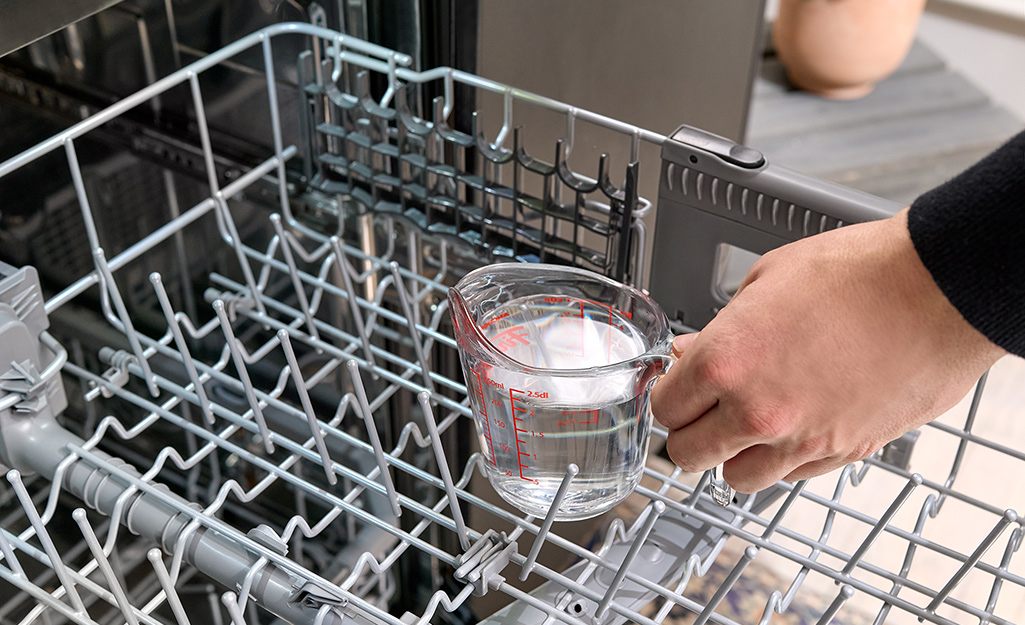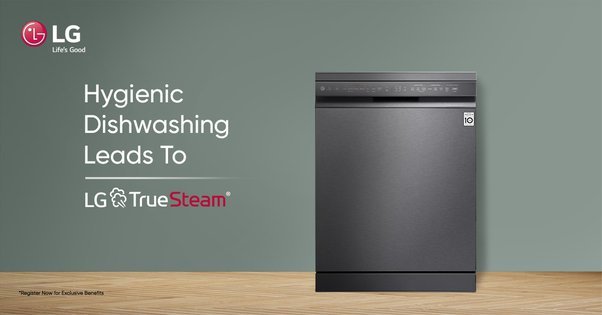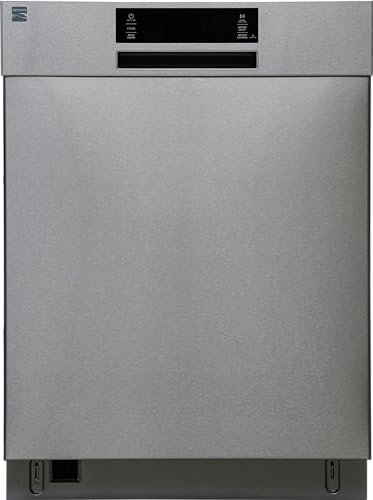To clean a smelly dishwasher, run a hot wash cycle with vinegar, and sprinkle baking soda on the bottom for a deodorizing effect. Regular cleaning of the filter and use of rinse aid can also prevent odors.
Dishwashers are essential for keeping your kitchenware clean, but they can develop unpleasant odors over time. Factors such as trapped food particles, grease, and soap residue contribute to the smelly situation. Addressing a foul-smelling dishwasher not only improves the scent of your kitchen but also ensures a hygienic environment for your dishes.
It’s important to tackle the smell swiftly to prevent it from affecting the taste and safety of your utensils. The steps mentioned are not just straightforward but also involve household items that are readily available, making the cleaning process convenient and cost-effective. Establishing regular maintenance routines can help keep your dishwasher fresh and extend its lifespan, saving you from costly repairs or replacements down the line.
Table of Contents
The Stench In The Kitchen: Tackling A Smelly Dishwasher
Other meta tags for SEO Introductory Paragraph
Nothing ruins a clean kitchen more than a smelly dishwasher. It’s a common issue many face. You deserve an odor-free kitchen, so let’s fix that stinky dishwasher!Identifying the Culprits
Identifying The Culprits: Reasons Behind The Odor
Several reasons cause a dishwasher to smell. Below are some common culprits:
- Trapped food particles: These can decay over time.
- Mold and mildew: Thrive in damp spaces.
- Grease buildup: Sticks to walls and filters.
- Drain hose issues: Blocked hoses trap dirty water.
Initial Assessment
Initial Assessment: When Did Your Dishwasher Last Smell Fresh?
Think back to when your dishwasher smelt clean. Has it been weeks or months? An older smell needs a deep clean.
| Assessment Point | Action Required |
|---|---|
| Recent odor | Quick maintenance might solve it. |
| Persistent odor | Deep cleaning is necessary. |
Tips to keep content SEO-friendly and engaging Ensure to use relevant keywords throughout the content Keep sentences short and easy to understand Use bulleted or numbered lists to make the content easy to scan Avoid technical jargon and write in layman’s terms as much as possible
Start With The Basics: Emptying And Rinsing
Welcome to the essential guide on cleaning a smelly dishwasher. Before diving into complex solutions, we’ll start with basic steps. These simple practices can make a huge difference and are quite easy to do.
The First Step: Clearing Out Old Dishes And Food Particles
Embarking on your mission to eradicate dishwasher odors begins with removal. Empty your dishwasher completely. Check for left behind bits of food, fallen utensils, or neglected dishes. These remnants contribute to foul smells.
- Remove all dishes and utensils from the unit.
- Inspect the racks for any forgotten items.
- Scrape off stuck-on food from surfaces and spinning arms.
Rinse Cycle: Removing Loose Debris And Residue
After clearing, focus on flushing out debris. A short rinse cycle helps dislodge particles. This step prevents clogs and reduces odor-causing residue.
- Run the dishwasher on a short rinse.
- No detergent needed, water does the job.
- Inspect the interior post-rinse for remaining debris.
Remember, routine emptying and rinsing are keys to a fresh dishwasher. A little effort goes a long way towards a clean, odor-free machine.
Deep Clean Essentials: Scrubbing And Deodorizing
Your dishwasher works hard to keep your dishes sparkling clean. Yet, sometimes, it can start to smell less than fresh. A deep clean will scrub away grime and eliminate odors. Follow these simple, yet effective, steps to freshen up your dishwasher and make it smell as good as new!
Filter Focused: How To Clean Your Dishwasher’s Filter Properly
The filter is the heart of a clean dishwasher. It catches food particles and needs regular cleaning. Here’s a step-by-step guide:
- Turn off the dishwasher and remove the bottom rack.
- Twist and pull out the filter.
- Rinse the filter under running water.
- Use a soft brush to scrub away trapped particles.
- Replace the filter and bottom rack.
Baking Soda And Vinegar: Natural Deodorizers At Work
Baking soda and vinegar are natural cleaning superheroes. Together, they deodorize and remove tough stains. Let’s see them in action:
- Sprinkle a cup of baking soda across the bottom of the dishwasher.
- Run a hot water cycle.
- After the cycle, pour two cups of vinegar into a dishwasher-safe bowl.
- Place the bowl on the top rack.
- Run another hot cycle.
Your dishwasher should now be rid of any foul smells and ready for its next load of dishes!

Credit: m.youtube.com
Monthly Maintenance: Preventative Cleaning Routines
Let’s dive into Monthly Maintenance: Preventative Cleaning Routines for your dishwasher. A proactive approach ensures that foul odors remain a thing of the past. Embrace simple, yet effective habits to keep your machine sparkling clean and smelling fresh.
Regular Rinse Aids: Enhancing Your Dishwasher’s Performance
To improve your dishwasher’s effectiveness, incorporate regular rinse aids. These solutions aid in drying and reduce spots and film build-up. Find a suitable rinse aid and follow these steps monthly:
- Fill the Rinse Aid Dispenser: Ensure it’s topped up to prevent water spots.
- Choose Quality: Opt for high-quality rinse aids that suit your dishwasher.
- Check Regularly: Keep an eye on the level and refill as needed.
Schedule It: Routine Cleaning For Long-term Freshness
Securing long-term freshness rests upon a scheduled cleaning routine. Here’s a simple checklist for your monthly maintenance:
- Inspect and Clean the Filter: Remove debris from the dishwasher filter.
- Wipe the Gaskets: Use a damp cloth to clean the door gaskets.
- Deodorize with Vinegar: Run a hot wash cycle with a cup of vinegar on the top rack.
- Freshen with Baking Soda: Sprinkle baking soda on the dishwasher floor and run a short cycle.
Troubleshoot The Trouble Spots: Seals And Accessories
Unpleasant odors from your dishwasher can ruin the sparkle of a clean kitchen. Your dishwasher’s seals and accessories might be to blame. It’s time to shine a light on these common culprits and banish bad smells for good.Door Seals: A Hidden Haven for Mold and Mildew
Door Seals: A Hidden Haven For Mold And Mildew
Door seals keep water inside during a wash. They also trap moisture, leading to mold and mildew growth. To clean, follow these simple steps:
- Inspect seals for food particles or grime.
- Use a soft cloth dampened with soapy water.
- Wipe down thoroughly and dry with a towel.
- For persistent mold, use a diluted bleach solution (1 tbsp bleach to 1 qt water).
- Rinse the area with water after cleaning.
- Leave the door open for a few hours to air out.
Utensil Baskets and Racks: Often Overlooked, Never Underestimated
Utensil Baskets And Racks: Often Overlooked, Never Underestimated
Utensil baskets and racks can harbor odors if not cleaned regularly. Keep them fresh with these tips:
- Remove baskets and racks from the dishwasher.
- Soak in hot, soapy water for 10-15 minutes.
- Scrub with a soft brush to remove residue.
- Rinse well and dry before placing back in the dishwasher.

Credit: m.youtube.com
Expert Hacks For A Fresher Dishwasher
Nobody likes a smelly dishwasher. It’s supposed to clean, not contribute to kitchen odors. Expert hacks can quickly transform your smelly dishwasher into a fresh-smelling kitchen sidekick. Let’s dive into some simple yet effective ways to banish those bad smells.
Citrus Power: A Zesty Solution For Odor Elimination
Citrus fruits, like lemons and oranges, aren’t just for eating. They’re natural deodorizers. Here’s how to use them:
- Chop a lemon or orange into small pieces.
- Place the pieces on the top rack.
- Run a normal cycle without dishes.
The heat will release citrus oils into the air. This neutralizes bad odors and leaves a fresh scent.
Commercial Cleaners: What Works And What Doesn’t
Commercial cleaners are plentiful, but they’re not all equal. Choose wisely for the best results.
Seek out enzymatic cleaners. They break down food particles and grease. This stops bad smells at their source.
| Type | Brand | Note |
|---|---|---|
| Enzymatic | Finish Dishwasher Cleaner | Removes limescale |
| Enzymatic | Affresh Dishwasher Cleaner | Tablet form |
Avoid bleach-based cleaners on stainless steel interiors. They can damage and discolor the surface.
Use these hacks to keep your dishwasher not only spotless but also smelling great.
Optimize Your Dishwasher’s Settings For Freshness
Let’s ensure your dishwasher smells fresh after each cycle. Optimizing your dishwasher’s settings can make a big difference. Here’s how.
Heat Matters: Using High-temperature Washes Wisely
Heat is a powerful ally in fighting odors. Check your dishwasher settings.
Many dishwashers feature a high-temperature wash option.
This setting gets rid of food residue and bacteria.
Use it to cleanse and deodorize your dishwasher.
Remember, high heat should be used wisely:
- Select this setting only when needed.
- Use for deep cleaning cycles, not for every wash.
- Ensure your dishes are high-temp safe.
Consistent use keeps smells away without wasting energy.
Drying Techniques: Avoiding The Trap Of Humidity
Humidity creates a haven for odors.
Choose a smart drying technique.
Your dishwasher likely has several drying options.
Find the one that removes moisture the best.
- Heated dry can speed up the process.
- Avoid humidity by opening the door slightly post-cycle.
- Air dry or fan-assist options work well too.
Reducing moisture reduces the chance of bad smells.

Credit: www.homedepot.com
The Role Of Usage Habits In Dishwasher Hygiene
The Role of Usage Habits in Dishwasher Hygiene is crucial in maintaining a fresh-smelling kitchen buddy. Our daily practices have a big impact on how clean our dishes come out, and more importantly, how our dishwasher smells. Let’s dive into the nifty tricks for keeping the stink at bay.
Scraping Vs. Pre-rinsing: Best Practices For Loading Dishes
It’s a common kitchen debate: to scrape or to pre-rinse? The best answer lies in a balance.
- Scraping off food bits is essential. It keeps the dishwasher filter clean and clear.
- Pre-rinsing under tap water is often unnecessary. Modern dishwashers handle the rest.
Dishwashers can detect food particles. They adjust their wash cycle to your dishes’ needs. Trust your machine and save water too!
Load Size And Frequency: Balancing Efficiency And Cleanliness
How often should you run your dishwasher? And how full should it be?
| Load Size | Frequency | Tips |
|---|---|---|
| Full Loads | Regular Schedule | Ensures efficiency and saves energy |
| Partial Loads | As Needed | Can lead to lingering odors if left too long |
Aim for full loads on a routine basis. This practice keeps smells from setting in. Emptying your dishwasher promptly also prevents musty odors from taking hold.
When To Call The Professionals: Recognizing Persistent Problems
Cleaning a smelly dishwasher can sometimes go beyond home remedies. Dishwashers do a lot for us, working hard to clean the dirty dishes we pile up. But even the best home care might not be enough. That’s where the professionals step in to tackle those persistent problems, ensuring our dishwashers keep running smoothly.
Signs You Need Expert Help
Always trust your nose and eyes if your dishwasher has an issue. Here are clear signs to watch for:
- Unpleasant smells that don’t go away after cleaning.
- Water not draining properly, leading to standing water.
- Unusual noises coming from the machine during a cycle.
- Dishes come out still dirty after a wash.
- Repeated errors or breakdowns despite troubleshooting.
The Cost-benefit Analysis Of Professional Cleaning
Professional cleaning does involve a cost, but the benefits can outshine the price tag:
| Cost | Benefits |
|---|---|
| Service fees | Longer appliance life |
| Parts replacement | Improved cleanliness |
| Time without a dishwasher | Energy efficiency |
| Possible inconvenience | Prevention of future issues |
Balancing the costs with the long-term savings and performance can make the decision easier. Professional cleaning could save you money and hassle in the long run.
Frequently Asked Questions
How To Get Rid Of Bad Smell In Dishwasher?
To eliminate bad smell in your dishwasher, run a hot cycle with a cup of vinegar on the top rack. Afterward, sprinkle baking soda across the bottom and run a short, hot cycle. Regular cleaning prevents odors.
How Do I Get The Sewer Smell Out Of My Dishwasher?
Clean the dishwasher filter. Run a vinegar cycle: Pour a cup of white vinegar into the bottom and run a hot-water cycle. Check the drain hose for proper installation and clogs. Ensure a high loop in the hose to prevent backflow.
Use baking soda for added freshness.
How Do I Freshen Up My Dishwasher?
To freshen up your dishwasher, start by placing a dishwasher-safe cup of white vinegar on the top rack. Run a hot-water cycle without dishes. Afterwards, sprinkle a cup of baking soda on the bottom and run a short cycle. This process removes odors and cleans residue.
How Do I Deodorize My Dishwasher Without Vinegar?
Use a dishwasher-safe bowl with baking soda overnight. Run a hot water cycle with lemon juice or peels for natural freshness.
Bottom Line
Keeping your dishwasher fresh doesn’t require complex solutions. Regular cleaning with vinegar, baking soda, or citrus peels can eliminate odors. For persistent smells, checking and cleaning filters is crucial. Embrace these simple methods to ensure your dishwasher stays odor-free and your dishes come out smelling clean every time.




